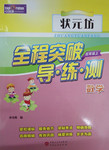题目内容
—Helen,when did you move here?
—I here since two years ago.
A. moved B. lived
C. have moved D. have lived
练习册系列答案
 状元坊全程突破导练测系列答案
状元坊全程突破导练测系列答案
相关题目
题目内容
—Helen,when did you move here?
—I here since two years ago.
A. moved B. lived
C. have moved D. have lived
 状元坊全程突破导练测系列答案
状元坊全程突破导练测系列答案